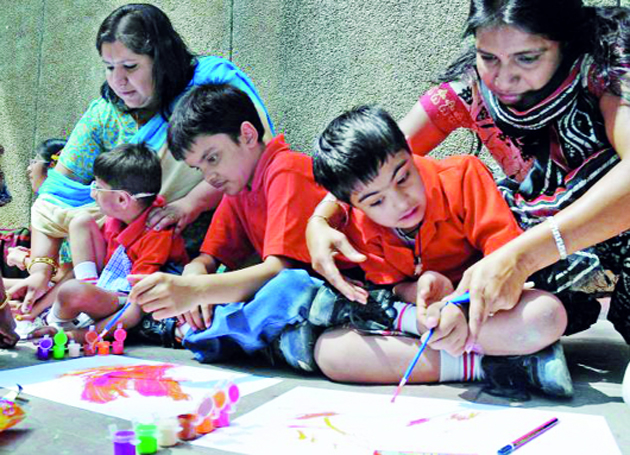Rizwana Fayaz
Every child should have an equal chance to acquire knowledge and succeed in a learning environment. However remedial help is essential for the academic and personal development of children with special needs.
This write up will discuss the idea of remedial support for kids with special needs and explain how it helps with their overall development. Before discussing it one must understand remedial Support.
Remedial support refers to the educational assistance provided to students who require additional help to meet their learning objectives. In the context of specially abled children, remedial support focuses on addressing their specific challenges and tailoring teaching methods to accommodate their unique learning styles and abilities.
Identifying Special Needs:
Autism spectrum diseases, attention deficit hyperactivity disorder (ADHD), dyslexia, intellectual disabilities, and speech or language impairments are only a few of the conditions that fall under the category of special needs.
Here are some key aspects to understand about remedial support for children with special needs and strategies thereof:
Individualized Education Programs (IEPs):
IEPs are comprehensive plans developed collaboratively by educators, parents, and specialists to address the specific needs of a special education student. These programs outline goals, teaching methods, and accommodation necessary to ensure the child’s success. Remedial support is often a fundamental component of an IEP.
Tailoring Instructional Strategies:
To provide remedial support, teachers must use varied teaching methods that take into account the unique learning preferences and skills of each child. To do this, it may be necessary to alter the instructional materials, employ multisensory techniques, deconstruct difficult ideas into simpler ones, and allot more time for study and practise.
Assistive Technology:
Technology advancements have completely changed the world of educational support for children with exceptional needs. The use of assistive technology tools, such as text-to-speech software, speech recognition software, and communication devices, can improve learning opportunities and help children get over potential roadblocks.
Small Group or One-on-One Instruction:
Providing special needs children with small groups or one-on-one instruction allows for more individualized attention and support. This can be particularly beneficial for children who require intensive remediation in specific areas.
Multi-sensory Teaching:
Incorporating multiple senses into the learning process can help special needs children better understand and retain information. For example, using visual aids, hands-on activities, and auditory cues simultaneously can enhance their learning experience.
Building Self-Esteem and Social Skills:
The goal of remedial education is to help students improve academically while also fostering their social and self-esteem. Children with special needs frequently struggle with social relationships with peers. Self-confidence, and self-advocacy. Remedial programs offer chances for socialization, inclusive activities, and promoting a positive self-image.
Collaboration between Educators and Specialists:
Collaboration between educators, professionals, and parents is necessary for effective remedial help. To execute focused interventions that meet a child’s unique requirements, teachers closely collaborate with professionals like speech therapists, occupational therapists, and behaviour analyzers. The development of the child is enhanced by frequent communication and common goals.
Positive Reinforcement and Motivation:
Children with special needs can gain from encouragement and positive reinforcement to maintain interest and concentrate. It is possible to keep their interest and increase their self-confidence by praising their efforts, celebrating their successes, and giving rewards or incentives.
Emotional and Social Support:
Children with special needs could need emotional and social help to deal with any difficulties they encounter. This may entail creating a supportive and welcoming learning environment in the classroom, offering chances for friendships and social contacts, and putting self-esteem and resilience-building techniques into practice.
Parent and Caregiver Involvement:
Collaboration between parents, caregivers, and educators is crucial in providing remedial support for special needs children. Regular communication, sharing of progress reports, and involving parents in goal setting can create a supportive network for the child.
Specialized Programs and Resources:
Investigate the specialized services, remedies, and tools created for children with certain learning difficulties or disabilities. Programmes for attention deficit hyperactivity disorder (ADHD), autism, dyslexia, and other diseases may be among them.
Progress Monitoring and Assessment:
Continuous progress monitoring and assessment are essential to guarantee the efficacy of remedial intervention. Teachers keep tabs on a student’s development, spot areas for improvement, and adjust plans as necessary. Gaining knowledge about a child’s performance outside of the classroom requires regular engagement with parents.individual needs Children go through extensive evaluations to determine their learning needs, skills, and limitations.Standardized exams, observations, interviews, and consultations with experts like psychologists, speech therapists, or occupational therapists may all be a part of the evaluation process.
Conclusion:
Reaching a special needs child’s full intellectual, emotional, and social potential depends heavily on remedial support. Teachers and professionals can provide these kids the help they need to succeed by customizing educational tactics, implementing assistive technology, and encouraging cooperation. A more inclusive and equitable education system will be possible for everyone if inclusive environments are created and individual needs are prioritized.


